23 start with N start with N

2012 Outstanding Co-Authored Book of the Year by the 2013 Distinguished Scholarship Awards Committee for the International and Intercultural Communication Division (IICD) of the National Communication Association (NCA)
Islamic extremism is the dominant security concern of many contemporary governments, spanning the industrialized West to the developing world. Narrative Landmines explores how rumors fit into and extend narrative systems and ideologies, particularly in the context of terrorism, counter-terrorism, and extremist insurgencies. Its concern is to foster a more sophisticated understanding of how oral and digital cultures work alongside economic, diplomatic, and cultural factors that influence the struggles between states and non-state actors in the proverbial battle of hearts and minds. Beyond face-to-face communication, the authors also address the role of new and social media in the creation and spread of rumors.
As narrative forms, rumors are suitable to a wide range of political expression, from citizens, insurgents, and governments alike, and in places as distinct as Singapore, Iraq, and Indonesia—the case studies presented for analysis. The authors make a compelling argument for understanding rumors in these contexts as “narrative IEDs,” low-cost, low-tech weapons that can successfully counter such elaborate and expansive government initiatives as outreach campaigns or strategic communication efforts. While not exactly the same as the advanced technological systems or Improvised Explosive Devices to which they are metaphorically related, narrative IEDs nevertheless operate as weapons that can aid the extremist cause.

Garry Wills is the polymathic public intellectual bemoaned as missing from American letters. A professor emeritus at Northwestern University, he has built upon his early studies in classics and patristics, while bringing his considerable intellect to bear on American culture, politics, and religion, notably through provocative articles and books on wars, past and present presidents, and the Catholic Church Wills has distinguished himself in the crowded field of Civil War history; fearlessly taken on the legacies of Richard Nixon and Ronald Reagan, among other presidents; and offered a critical voice in many fraught ethical discussions, especially in the areas of war and peace.
Nation and World, Church and God gathers original critical reflections by leading writers and scholars on Garry Wills’s life work. Organized around the themes of “Classics,” “Civil War,” “War and Peace,” and “Theology, Church, and the Arts,” the book reflects the cultural acumen, fine-grained political analysis, ethical candor, and theological wisdom of one of America’s most prolific writers.
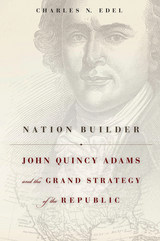
“America goes not abroad, in search of monsters to destroy”—John Quincy Adams’s famous words are often quoted to justify noninterference in other nations’ affairs. Yet when he spoke them, Adams was not advocating neutrality or passivity but rather outlining a national policy that balanced democratic idealism with a pragmatic understanding of the young republic’s capabilities and limitations. America’s rise from a confederation of revolutionary colonies to a world power is often treated as inevitable, but Charles N. Edel’s provocative biography of Adams argues that he served as the central architect of a grand strategy that shaped America’s rise. Adams’s particular combination of ideas and policies made him a critical link between the founding generation and the Civil War–era nation of Lincoln.
Examining Adams’s service as senator, diplomat, secretary of state, president, and congressman, Edel’s study of this extraordinary figure reveals a brilliant but stubborn man who was both visionary prophet and hard-nosed politician. Adams’s ambitions on behalf of America’s interests, combined with a shrewd understanding of how to counter the threats arrayed against them, allowed him to craft a multitiered policy to insulate the nation from European quarrels, expand U.S. territory, harness natural resources, develop domestic infrastructure, education, and commerce, and transform the United States into a model of progress and liberty respected throughout the world.
While Adams did not live to see all of his strategy fulfilled, his vision shaped the nation’s agenda for decades afterward and continues to resonate as America pursues its place in the twenty-first-century world.
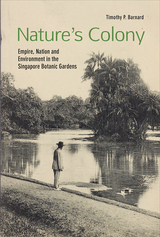
Initially conceived to exploit nature for the benefit of empire, the Gardens were part of a symbolic struggle by administrators, scientists, and gardeners to assert dominance within Southeast Asia’s tropical landscape, reflecting shifting understandings of power, science, and nature among local administrators and distant mentors in Britain. Consequently, as an outpost of imperial science, the Gardens were instrumental in the development of plantation crops, such as rubber and oil palm, which went on to shape landscapes across the globe. Since the independence of Singapore, the Gardens have played a role in the “greening” of the country and have been named as Singapore’s first World Heritage Site. Setting the Gardens alongside the Royal Botanic Gardens, Kew, and botanic gardens in India, Ceylon, Mauritius, and the West Indies, Nature’s Colony provide the first in-depth look at the history of this influential institution.
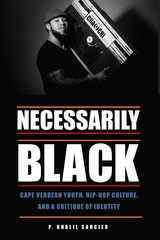
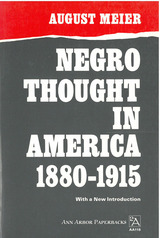

Simultaneously transnational and local, poetry in the twenty-first century is produced across digital networks, shaped through local communities, and evaluated on a global scale. It might start on social media, where a video of a poet circulates and goes viral, gaining international attention without ever going through traditional modes of publication. In Networked Poetics, Susanna L. Sacks introduces readers to the southern African poetry scene in Malawi, Zimbabwe, and South Africa, illustrating how contemporary poetry is shaped, from inception to canonization, by the influence of digital media publication.
Interweaving ethnographic observation and extensive literary analysis, Sacks demonstrates that, as more artists in Africa reach wider audiences through online publication, poetic form has shifted to reflect social media’s aesthetic norms of urgency, immediacy, and populism. These changes have, in turn, challenged elite processes of valuation, forcing literary institutions like prizes, festivals, and curricula to accommodate the digital turn.

“The New Berlin is a notable contribution to human geography and to the interdisciplinary literature on social memory and place making. Till’s methods and scholarship have provided the conceptual groundwork for the exploration and development of place making, social memory, and spatial haunting through the particular practices and politics of the new Berlin. Her readable style is marked by a narrative economy in which every word and sentence serves the larger purposes of the book. I recommend this book to anyone—student, scholar, or practitioner—who is interested in the social dynamics of memory formation and place making.” —The Professional Geographer
“This book is a well-written ‘first-hand’ account, though it also thoroughly covers academic literature, contemporary news accounts, and archival records.” —German Studies Review
“Karen E. Till's The New Berlin describes the modern metropolis and the ghosts of the past that it has to deal with.” —German World
“Well illustrated and copiously footnoted, this is a cutting-edge study of the power of identity-construction/analysis. Highly recommended.” —CHOICE

While overconsumption by the developed world's roughly one billion inhabitants is an abiding problem, another one billion increasingly affluent "new consumers" in developing countries will place additional strains on the earth's resources, argue authors Norman Myers and Jennifer Kent in this important new book.
The New Consumers examines the environmental impacts of this increased consumption, with particular focus on two commodities -- cars and meat -- that stand to have the most far-reaching effects. It analyzes consumption patterns in a number of different countries, with special emphasis on China and India (whose surging economies, as well as their large populations, are likely to account for exceptional growth in humanity's ecological footprint), and surveys big-picture issues such as the globalization of economies, consumer goods, and lifestyles. Ultimately, according to the orman Myers and Jennifer Kent, the challenge will be for all of humanity to transition to sustainable levels of consumption, for it is unrealistic to expect "new" consumers not to aspire to be like the "old" ones.
Cogent in its analysis, The New Consumers issues a timely warning of a major and developing environmental trend, and suggests valuable strategies for ameliorating its effects.
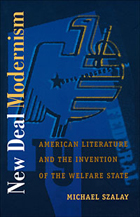
Szalay situates his study within a liberal culture bent on security, a culture galvanized by its imagined need for private and public insurance.
Taking up prominent exponents of social and economic security—such as Franklin Delano Roosevelt, John Maynard Keynes, and John Dewey—Szalay demonstrates how the New Deal’s revision of free-market culture required rethinking the political function of aesthetics. Focusing in particular on the modernist fascination with the relation between form and audience, Szalay offers innovative accounts of Busby Berkeley, Jack London, James M. Cain, Robert Frost, Ayn Rand, Betty Smith, and Gertrude Stein, as well as extended analyses of the works of Ernest Hemingway, John Steinbeck, and Richard Wright.
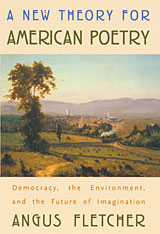
Amid gloomy forecasts of the decline of the humanities and the death of poetry, Angus Fletcher, a wise and dedicated literary voice, sounds a note of powerful, tempered optimism. He lays out a fresh approach to American poetry at large, the first in several decades, expounding a defense of the art that will resonate well into the new century.
Breaking with the tired habit of treating American poets as the happy or rebellious children of European romanticism, Fletcher uncovers a distinct lineage for American poetry. His point of departure is the fascinating English writer, John Clare; he then centers on the radically American vision expressed by Emerson and Walt Whitman. With Whitman this book insists that "the whole theory and nature of poetry" needs inspiration from science if it is to achieve a truly democratic vista. Drawing variously on Complexity Theory and on fundamentals of art and grammar, Fletcher argues that our finest poetry is nature-based, environmentally shaped, and descriptive in aim, enabling poets like John Ashbery and other contemporaries to discover a mysterious pragmatism.
Intense, resonant, and deeply literary, this account of an American poetics shows how today's consumerist and conformist culture subverts the imagination of a free people. While centering on American vision, the argument extends our horizon, striking a blow against all economically sanctioned attacks upon the finer, stronger human capacities. Poetry, the author maintains, is central to any coherent vision of life.
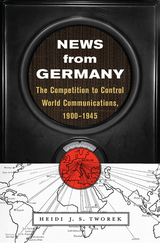
Winner of the Barclay Book Prize, German Studies Association
Winner of the Gomory Prize in Business History, American Historical Association and the Alfred P. Sloan Foundation
Winner of the Fraenkel Prize, Wiener Library for the Study of Holocaust and Genocide
Honorable Mention, European Studies Book Award, Council for European Studies
To control information is to control the world. This innovative history reveals how, across two devastating wars, Germany attempted to build a powerful communication empire—and how the Nazis manipulated the news to rise to dominance in Europe and further their global agenda.
Information warfare may seem like a new feature of our contemporary digital world. But it was just as crucial a century ago, when the great powers competed to control and expand their empires. In News from Germany, Heidi Tworek uncovers how Germans fought to regulate information at home and used the innovation of wireless technology to magnify their power abroad.
Tworek reveals how for nearly fifty years, across three different political regimes, Germany tried to control world communications—and nearly succeeded. From the turn of the twentieth century, German political and business elites worried that their British and French rivals dominated global news networks. Many Germans even blamed foreign media for Germany’s defeat in World War I. The key to the British and French advantage was their news agencies—companies whose power over the content and distribution of news was arguably greater than that wielded by Google or Facebook today. Communications networks became a crucial battleground for interwar domestic democracy and international influence everywhere from Latin America to East Asia. Imperial leaders, and their Weimar and Nazi successors, nurtured wireless technology to make news from Germany a major source of information across the globe. The Nazi mastery of global propaganda by the 1930s was built on decades of Germany’s obsession with the news.
News from Germany is not a story about Germany alone. It reveals how news became a form of international power and how communications changed the course of history.

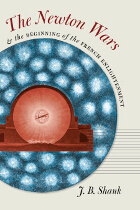
A comprehensive study of public culture, The Newton Wars and the Beginning of the French Enlightenment digsbelow the surface of the commonplace narratives that link Newton with Enlightenment thought to examine the actual historical changes that brought them together in eighteenth-century time and space. Drawing on the full range of early modern scientific sources, from studied scientific treatises and academic papers to book reviews, commentaries, and private correspondence, J. B. Shank challenges the widely accepted claim that Isaac Newton’s solitary genius is the reason for his iconic status as the father of modern physics and the philosophemovement.
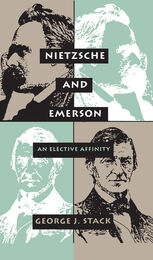
George J. Stack traces the sources of ideas and theories that have long been considered the exclusive province of Friedrich Nietzsche to the surprisingly radical writings of the American essayist and poet, Ralph Waldo Emerson.
Nietzsche and Emerson makes us see Emerson’s writings in a new, more intensified light and presents a new perspective on Nietzsche’s philosophy. Stack traces how the rich theoretical ideas and literary images of Emerson entered directly into the existential dimension of Nietzsche’s thought and hence into the stream of what has been considered a distinctively European intellectual movement.
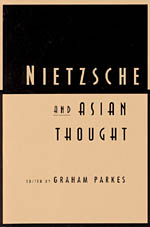
The contributors are Roger T. Ames, Johann Figl, Chen Guying, Michel Hulin, Arifuku Kogaku, David A. Kelly, Glen T. Martin, Sonoda Muneto, Graham Parkes, okochi Ryogi, Eberhard Scheiffele, Mervyn Sprung, and Joan Stambaugh.
"Exemplary. Its comparative approach is incisive yet accessible. I consider it a 'must read'"—Kathleen Marie Higgins, Philosophy East and West
"An excellent introduction to the broad ranging reception of Nietzsche among Asian thinkers."—James R. Watson, Canadian Philosophical Review
"The essays in this welcome collection are invariably thought-provoking and genuinely cross-disciplinary."—Kenneth Surin, Religious Studies Review
"A worthy and undogmatic introduction to several fascinating questions concerning the relations between Nietzschean thought and certain traditions of thought in India, China, and Japan."—Don Miller, Asian Studies Review
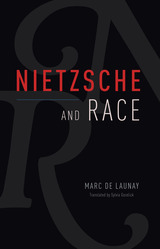
The caricature of Friedrich Nietzsche as a proto-Nazi is still with us, having originated with his own Nazi sister, Elisabeth Förster, who curated Nietzsche’s disparate texts to suit her own purposes. In Nietzsche and Race, Marc de Launay deftly counters this persistent narrative in a series of concise and highly accessible reflections on the concept of race in Nietzsche’s publications, notebooks, and correspondence. Through a fresh reading of Nietzsche’s core philosophical project, de Launay articulates a new understanding of race in Nietzsche’s body of work free from the misunderstanding of his detractors.

Waite advances his argument by bringing Marxist—especially Gramscian and Althusserian—theories to bear on the concept of Nietzsche/anism. But he also goes beyond ideological convictions to explore the vast Nietzschean influence that proliferates throughout the marketplace of contemporary philosophy, political and literary theory, and cultural and technocultural criticism. In light of a philological reconstruction of Nietzsche’s published and unpublished texts, Nietzsche’s Corps/e shuttles between philosophy and everyday popular culture and shows them to be equally significant in their having been influenced by Nietzsche—in however distorted a form and in a way that compromises all of our best interests.
Controversial in its “decelebration” of Nietzsche, this remarkable study asks whether the postcontemporary age already upon us will continue to be dominated and oriented by the haunting spectre of Nietzsche’s corps/e. Philosophers, intellectual historians, literary theorists, and those interested in western Marxism, popular culture, Friedrich Nietzsche, and the intersection of French and German thought will find this book both appealing and challenging.
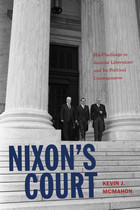
Most analysts have deemed Richard Nixon’s challenge to the judicial liberalism of the Warren Supreme Court a failure—“a counterrevolution that wasn’t.” Nixon’s Court offers an alternative assessment. Kevin J. McMahon reveals a Nixon whose public rhetoric was more conservative than his administration’s actions and whose policy towards the Court was more subtle than previously recognized. Viewing Nixon’s judicial strategy as part political and part legal, McMahon argues that Nixon succeeded substantially on both counts.
Many of the issues dear to social conservatives, such as abortion and school prayer, were not nearly as important to Nixon. Consequently, his nominations for the Supreme Court were chosen primarily to advance his “law and order” and school desegregation agendas—agendas the Court eventually endorsed. But there were also political motivations to Nixon’s approach: he wanted his judicial policy to be conservative enough to attract white southerners and northern white ethnics disgruntled with the Democratic party but not so conservative as to drive away moderates in his own party. In essence, then, he used his criticisms of the Court to speak to members of his “Silent Majority” in hopes of disrupting the long-dominant New Deal Democratic coalition.
For McMahon, Nixon’s judicial strategy succeeded not only in shaping the course of constitutional law in the areas he most desired but also in laying the foundation of an electoral alliance that would dominate presidential politics for a generation.
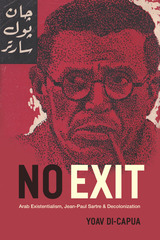
By closely following the remarkable career of Arab existentialism, Yoav Di-Capua reconstructs the cosmopolitan milieu of the generation that tried to articulate a political and philosophical vision for an egalitarian postcolonial world. He tells this story by touring a fascinating selection of Arabic and Hebrew archives, including unpublished diaries and interviews. Tragically, the warm and hopeful relationships forged between Arab intellectuals, Sartre, Simone de Beauvoir, and others ended when, on the eve of the 1967 war, Sartre failed to embrace the Palestinian cause. Today, when the prospect of global ethical engagement seems to be slipping ever farther out of reach, No Exit provides a timely, humanistic account of the intellectual hopes, struggles, and victories that shaped the Arab experience of decolonization and a delightfully wide-ranging excavation of existentialism’s non-Western history.
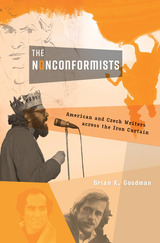
How risky encounters between American and Czech writers behind the Iron Curtain shaped the art and politics of the Cold War and helped define an era of dissent.
“In some indescribable way, we are each other’s continuation,” Arthur Miller wrote of the imprisoned Czech playwright Václav Havel. After a Soviet-led invasion ended the Prague Spring, many US-based writers experienced a similar shock of solidarity. Brian Goodman examines the surprising and consequential connections between American and Czech literary cultures during the Cold War—connections that influenced art and politics on both sides of the Iron Curtain.
American writers had long been attracted to Prague, a city they associated with the spectral figure of Franz Kafka. Goodman reconstructs the Czech journeys of Allen Ginsberg, Philip Roth, and John Updike, as well as their friendships with nonconformists like Havel, Josef Škvorecký, Ivan Klíma, and Milan Kundera. Czechoslovakia, meanwhile, was home to a literary counterculture shaped by years of engagement with American sources, from Moby-Dick and the Beats to Dixieland jazz and rock ’n’ roll. Czechs eagerly followed cultural trends in the United States, creatively appropriating works by authors like Langston Hughes and Ernest Hemingway, sometimes at considerable risk to themselves.
The Nonconformists tells the story of a group of writers who crossed boundaries of language and politics, rearranging them in the process. The transnational circulation of literature played an important role in the formation of new subcultures and reading publics, reshaping political imaginations and transforming the city of Kafka into a global capital of dissent. From the postwar dream of a “Czechoslovak road to socialism” to the neoconservative embrace of Eastern bloc dissidence on the eve of the Velvet Revolution, history was changed by a collision of literary cultures.
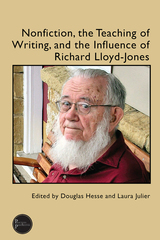

READERS
Browse our collection.
PUBLISHERS
See BiblioVault's publisher services.
STUDENT SERVICES
Files for college accessibility offices.
UChicago Accessibility Resources
home | accessibility | search | about | contact us
BiblioVault ® 2001 - 2024
The University of Chicago Press









